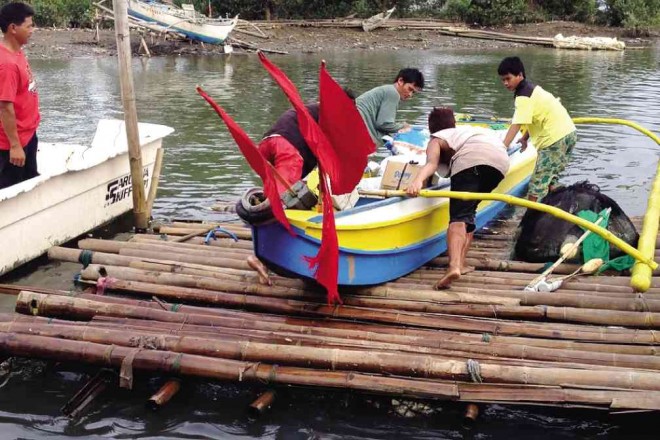
THE HARD-UP people of Sitio Pulo, Navotas City, pay it forward with this small boat of relief items. PHOTO BY NATHANIEL R. MELICAN
After being perennial recipients of aid whenever storms hit their community, residents of an island shantytown in Navotas City saw the recent calamity in the Visayas region as a chance to return the favor.
Manuelito Villanueva spent Friday morning collecting relief items from the people of Sitio Pulo in Barangay Tanza. He is one of the leaders of Samaisip, an urban poor organization of 135 families, who last week agreed to help victims of Supertyphoon “Yolanda”— even though they themselves face an everyday tempest called poverty.
“This is the first time ever that we are contributing to a relief effort. In the past, it was our community that had been ravaged by storms and we were always the ones receiving aid. Now we’re giving back to other victims, as a ‘thank you’ note for all those times they had helped us,” Villanueva told the Inquirer.
Sitio Pulo is located between a row of fish ponds on the east and Manila Bay on the west. Most of the men on the island eke out a living by fishing in the open water or harvesting crabs and other seafood in the ponds. The women help out by putting up sari-sari stores, taking laundry, or weaving fishing nets.
“Fishing is quite hard these days. Many of us go out to sea three times a week and return with nothing,” Villanueva said. “We consider ourselves lucky if we earn P500 (after several trips),” Villanueva said.
And yet seeing Yolanda’s wrath in the news moved the community to contribute to the Navotas City government’s relief effort. “We’ve been accustomed to typhoons. Two years ago, Typhoon ‘Pedring’ wiped out all the houses along the edge of the water, leaving about 45 families homeless.”
But thanks to relief agencies and civic groups, whose humanitarian missions sent not just food but also blankets, utensils, plywood and other construction materials to the island, Sitio Pulo soon recovered and started rebuilding.
“Two weeks ago, we again braced ourselves for the worst as Yolanda was reported to be moving closer to Metro Manila. We acted immediately and evacuated our children and their mothers to Tanza Elementary School. We’re just thankful that we were spared,” Villanueva said.
Hearing about the preemptive evacuation, aid agencies again pledged to help Sitio Pulo, but Villanueva and his fellow Samaisip officers politely turned them down since other people deserved assistance.
INSIDE a poor man’s shed on Sitio Pulo, sacks of relief items for “Yolanda” survivors pile up. PHOTO BY NATHANIEL R. MELICAN
“Yes, we know it’s a struggle to make ends meet here, but there are others who need those relief items more than we do,” Villanueva said.
Instead of accepting aid, the community mobilized to collect aid in behalf of Yolanda survivors, a project that ended Friday with a pile of donations consisting of 18 sacks of used clothes and three boxes of food items.
“I expected them to give something, but not this much!” Villanueva said. “That’s quite a lot—because I know we’re all poor!”
“Some families contributed a can of sardines each, others gave packs of instant noodles, while others gave a few packs of biscuits,” he said. “Many of them gave clothes that still looked new. I’ve seen some mothers who made sure they were giving items that were still in good condition and not mere throwaways.”
On Friday afternoon, Villanueva borrowed a boat to bring the relief items to the Navotas “mainland,” where a barangay service vehicle waiting on the shoreline later picked them up for delivery to City Hall.
From there, the local government would send the donations to the devastated towns of Lawaan and Giporlos in Eastern Samar.
As Villanueva and other volunteers unloaded the sacks and boxes from the boat, one fisherman had a little chat with him, asking: “Why help them (Yolanda victims) when you need help yourselves?”
“We really wanted to help,” Villanueva replied. “Our contribution may be small, but it comes from the heart.”
The fisherman smiled: “That’s why no storm can destroy your community. You really have big hearts.”